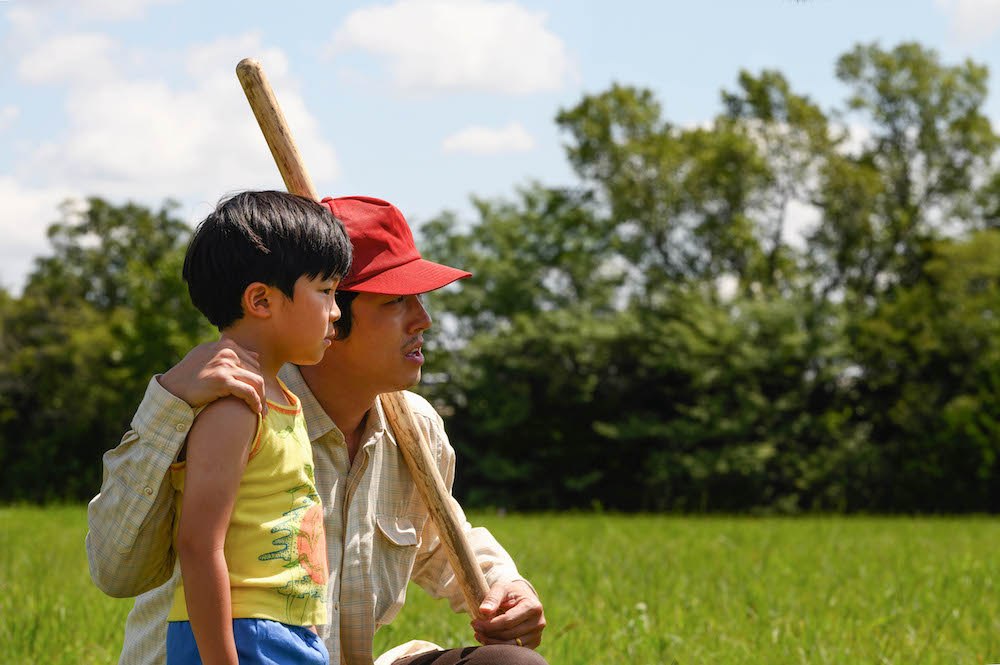Film Review: Minari (2021)



If I were to ask you to name five films off the top of your head that embody the spirit of the American Dream, you’d probably have the first two in mind before finishing this sentence. As moviegoers, we love films about grit and determination; about stick-to-itiveness and hard work that pay off for everyday working families. It’s easy to relate to a success story because we all want to succeed. Rooting for underdogs can feel like rooting for ourselves and our families, and that is as natural as a sunrise. Time and again we’ve seen films about the American Dream – its pursuit, cruelties, joys, etc. – but rarely are they presented so intimately and so layered as they are in Lee Isaac Chung’s Minari.

This largely autobiographical film, which centers on a small slice of Chung’s upbringing, tells the story of Jacob Yi (Steven Yeun), a South Korean immigrant who moves his family to a small farm in rural Arkansas in the 1980s. Determined to carve out his own path, Jacob sinks the family savings into the farm, convinced that with enough patience and perseverance, he can finally provide his family with the kind of comfort and stability they deserve. Not convinced, Jacob’s wife Monica (Han Ye-ri) and their children David and Anne (Alan Kim and Noel Kate Cho), navigate their new surroundings with varying degrees of optimism and trepidation. When Monica’s elderly mother (Youn Yuh-jung) arrives to help with the kids, old and new world values clash in unexpected ways, adding a richly rewarding depth to an already wonderful family drama.

Chung’s American Dream refreshingly has nothing to do with greed or one-upmanship. He prizes contentment over accumulation and community over isolation. As immigrants, the Yi family struggles with striking a balance between assimilation and preserving their Korean customs and traditions, but do so in ways that form naturally from specific and subtle situations rather than an overbearing cloud of unacceptance or exclusion. While some small-town residents certainly show their tone-deaf ignorance of cultures different from their own, Minari is not a story of racism or intolerance, but one of adaptation and acceptance of a new way of living.

What propels Chung’s film above the pack isn’t that it explores its themes with more gusto than those that tread similar ground, or that it offers any new or mysterious revelations about the ups and downs of family tension and economic hardships, but that through a seemingly unrelatable set of circumstances (South Korean immigrants on a farm in Arkansas over the course of a few months in the 1980s) it reinforces universally accessible truths to anyone who has ever dared to dream of a better life. Much more than the sum of its small, specific parts, Minari encapsulates both the triumph and tragedy of the best immigrant stories, and a distinctly American entrepreneurial spirit, all without succumbing to an ounce of cliché or Oscar-bait overacting.

Taking full advantage of beautiful sunsets painted over pastoral landscapes, Minari harkens back to magic-hour masterpieces like Terrence Malick’s Days of Heaven (1978) in more ways than one – albeit with far less deception and violence. As the crickets chirp and the sweat glistens off the skin, Lachlan Milne’s arresting cinematography is topped only by the power of the film’s performances, which are a boiling pot of reserved emotion. Once again defying all expectations, each member of this wonderful cast – which includes Will Patton as Paul, a devout hired hand – so utterly embodies, then so thoroughly defies all expectations that any notion of “type” goes flying out the window. Yeun proves especially (and unsurprisingly after 2018’s Burning) adept at capturing male dualisms like stubbornness and muted passivity, while delicately conveying concepts of acculturation and acute self-realization. These polarities, along with an abundance of warmth and just enough nervous hope make Minari not only one of the best films of the year, but one of the most American.
